|
|
|
Sort Order |
|
|
|
Items / Page
|
|
|
|
|
|
|
| Srl | Item |
| 1 |
ID:
180163
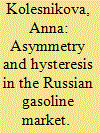

|
|
|
|
|
| Summary/Abstract |
Using monthly data of 79 Russian regions from 2003 to 2017, we study the long-run relationship of the retail gasoline prices with the crude oil price and the nominal exchange rate. We find that models that were successfully applied to deal with asymmetries in other countries are not suitable for Russia without taking structural breaks into account. Once breaks are allowed, we find that there is no asymmetry in the long-run elasticities between the gasoline prices and the crude oil price, and no significant hysteresis. However, there is an asymmetric relation between the gasoline price and the exchange rate that has decreased over time. These results also hold after several robustness checks. The evidence reported in this work shows that the effects of the exchange rate on gasoline prices are much more difficult to control than the oil price, and they require a larger set of policy measures: the recent development of a plan to decrease the importance of hydrocarbons exports by producing clean hydrogen using electrolysis and pyrolysis and the potential future export of electricity generated using nuclear power and onshore wind farms may help to diversify the local economy and to shield it from new sanctions.
|
|
|
|
|
|
|
|
|
|
|
|
|
|
|
|
| 2 |
ID:
093547


|
|
|
|
|
| Publication |
2010.
|
| Summary/Abstract |
In this paper we test the Environment Kuznet's Curve (EKC) hypothesis for 43 developing countries. We suggest examining the EKC hypothesis based on the short- and long-run income elasticities; that is, if the long-run income elasticity is smaller than the short-run income elasticity then it is evident that a country has reduced carbon dioxide emissions as its income has increased. Our empirical analysis based on individual countries suggests that Jordan, Iraq, Kuwait, Yemen, Qatar, the UAE, Argentina, Mexico, Venezuela, Algeria, Kenya, Nigeria, Congo, Ghana, and South Africa-approximately 35 per cent of the sample-carbon dioxide emissions have fallen over the long run; that is, as these economies have grown emissions have fallen since the long-run income elasticity is smaller than the short-run elasticity. We also examine the EKC hypothesis for panels of countries constructed on the basis of regional location using the panel cointegration and the panel long-run estimation techniques. We find that only for the Middle Eastern and South Asian panels, the income elasticity in the long run is smaller than the short run, implying that carbon dioxide emission has fallen with a rise in income.
|
|
|
|
|
|
|
|
|
|
|
|
|
|
|
|
| 3 |
ID:
094946


|
|
|
|
|
| Publication |
2010.
|
| Summary/Abstract |
About ten years have passed since the deregulation of the U.S. retail electricity market, and it is now generally accepted that the available data is adequate to quantitatively assess and compare conditions before and after deregulation. This study, therefore, estimates the changes in price elasticity in the residential electricity market to examine the changes, if any, in household sensitivity (as a result of retail electricity market deregulation policies) to residential electricity rates. Specifically, six types of panel data are prepared, based on three cross-sections-all states (except for Alaska and Hawaii) and the District of Columbia, deregulated states, and non-deregulated states-and two time series-the period before deregulation and the period after deregulation. The panel empirical analysis techniques are used to determine whether or not the variables are stationary, and to estimate price elasticity. We find that there is no substantial difference in the price elasticity between deregulated and non-deregulated states for both periods-before deregulation and after deregulation. Thus, it can be said that the deregulation of the retail electricity market has not made consumers more sensitive to electricity rates and that retail deregulation policies are not the cause of price elasticity differences between deregulated and non-deregulated states.
|
|
|
|
|
|
|
|
|
|
|
|
|
|
|
|
| 4 |
ID:
111096
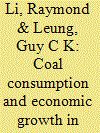

|
|
|
|
|
| Publication |
2012.
|
| Summary/Abstract |
The aim of this paper is to re-examine the relationship between coal consumption and real GDP of China with the use of panel data. This paper applies modern panel data techniques to help shed light on the importance of the heterogeneity among different regions within China. Empirical analyses are conducted for the full panel as well as three subgroups of the panel. The empirical results show that coal consumption and GDP are both I(1) and cointegrated in all regional groupings. Heterogeneity is found in the GDP equation of the full panel. The regional causality tests reveal that the coal consumption-GDP relationship is bidirectional in the Coastal and Central regions whereas causality is unidirectional from GDP to coal consumption in the Western region. Thus, energy conservation measures will not adversely affect the economic growth of the Western region but such measures will likely encumber the economy of the Coastal and Central regions, where most of the coal intensive industries are concentrated.
|
|
|
|
|
|
|
|
|
|
|
|
|
|
|
|
| 5 |
ID:
116234


|
|
|
|
|
| Publication |
2012.
|
| Summary/Abstract |
This article empirically explores the relationship between military expenditure, external debts and economic performance in the economies of sub-Saharan Africa using a sample of 25 countries from 1988-2007. In investigating the defence-external debt nexus, we employ three advanced panel techniques of fully modified OLS (FMOLS), Dynamic OLS (DOLS) and dynamic fixed effect (DFE) to estimate our model. We observe that military expenditure has a positive and significant impact on external debt in African countries. Real GDP affects the total debt stock of African countries with a negative relationship. Our empirical results based on long-run elasticities show that a 1% rise in national output leads to a decline in external debt by 1.52%, on average. Policy-wise, the study suggests that African countries need to strengthen areas of fiscal responsibility and pursue models that encourage rational spending, particularly reductions in military expenditure.
|
|
|
|
|
|
|
|
|
|
|
|
|
|
|
|
| 6 |
ID:
121190


|
|
|
|
|
| Publication |
2013.
|
| Summary/Abstract |
This article empirically examines the determinants of trade development for South Asian countries over the period 1980-2010 using panel analysis. The result of unit root indicates that all the variables are appropriate for panel cointegration. The panel cointegration test reveals long-run relationship between trade ratio and its determinants. The panel fully modified ordinary least squares (FMOLS) long-run coefficients indicate that per capita income growth, trade liberalization, human capital, financial and infrastructure development have played a major role in influencing trade growth in South Asia.
|
|
|
|
|
|
|
|
|
|
|
|
|
|
|
|
| 7 |
ID:
076957


|
|
|
|
|
| Publication |
2007.
|
| Summary/Abstract |
This paper empirically re-examines the long-run co-movements and the causal relationships between GDP and defence expenditures in a multivariate model with real defence expenditure per capita (ME), real GDP per capita (GDP), and real capital stock per capita (K). We apply the view of the aggregate production function to construct the empirical model. Using up-to-date data for 27 OECD countries and 62 non-OECD countries for the 1988-2003 period, we combine cross-sectional and time series data to re-investigate the relationship between GDP and ME. Previous studies using time series data may have yielded misleading results on account of the short time span of typical datasets. By contrast, we use recently developed panel unit root tests and heterogeneous panel cointegration tests, and conclude that there is fairly strong evidence in favour of the hypothesis of a long-run equilibrium relationship between GDP and ME. The long-run panel regression parameter results, such as the fully modified OLS, indicate that a positive relationship between GDP and ME only holds for OECD countries, whereas a negative relationship from ME to GDP only exists in non-OECD countries under examination and in the panel as a whole. Furthermore, by implementing the dynamic panel-based error correction model, we determine that GDP and ME lack short-run causalities, but do show long-run bidirectional causalities in both OECD and non-OECD countries
|
|
|
|
|
|
|
|
|
|
|
|
|
|
|
|
| 8 |
ID:
166297
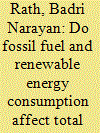

|
|
|
|
|
| Summary/Abstract |
This study examines whether types of energy consumption affects the total factor productivity (TFP) growth. Using annual data of 1981–2013 for the panel sample of 36 countries, the results show that fossil fuel consumption declines the TFP growth, whereas, renewable energy consumption boosts the TFP growth. However, the results vary across different sub-panels. Further, the results from panel Granger causality support the feedback hypothesis in the long-run, whereas, weak evidence is found in the short-run. Since our findings supported feedback hypothesis, thus, policy should focus on reducing fossil fuel and using more renewable energy for achieving a ‘‘win-win’’ position of sustainable higher productivity growth with protective environmental quality in the long-run.
|
|
|
|
|
|
|
|
|
|
|
|
|
|
|
|
| 9 |
ID:
133213


|
|
|
|
|
| Publication |
2014.
|
| Summary/Abstract |
This paper estimates the relationships between bidding quantities, marginal cost and market power measures in the Spanish wholesale electricity market for two different regulatory periods: 2002-2005 and 2006-2007. Using panel econometric techniques we find differences in the impacts on bidding strategies for both periods. Hence, the marginal cost and the market power measures affect bid and net quantities. The market power measures also suggest that the coefficient is consistently positive and highly significant for both periods.
Moreover, the market power and marginal costs have mixed effects according to the models proposed for both periods. In addition, our results point to the effectiveness of the different effects of mitigating the market power in the Spanish electricity market. For the 2006-2007 period, the proposed causal relationships are partially validated by the cointegration results, which assumes there is a significant causality between the Lerner Index and the marginal cost.
|
|
|
|
|
|
|
|
|
|
|
|
|
|
|
|
| 10 |
ID:
155845


|
|
|
|
|
| Summary/Abstract |
China’s defence expenditure has been growing rapidly along with GDP growth during the past two decades. Meanwhile, the income gap has continued to increase. There are conflicting views regarding whether the defence expenditure is capable of reducing income inequality. Therefore, this paper investigates the existence of any spillover effect of defence expenditure on income inequality, with a special focus on the regional differences among 31 provinces and 7 military regions in China. We extend panel cointegration and the impulse response function by using panel data during the period of 1997–2012. The empirical results show that the defence expenditure has an impact on income inequality, and the effect varies over different regions in China. The defence expenditure has a spillover effect on income inequality in the full sample panel and the southeastern panel. An increase in the defence expenditure does not crowd out social welfare spending due to the high level of economic development and government expenditure. On the contrary, in the northern panel, the effect is opposite because of the unbalanced economic development levels within the panel. Beijing as the capital of China, benefits more from the expansion of defence expenditure thus widening the income gap. In addition, the impulse response analyses further confirm a stronger effect of the defence expenditure on income inequality in the northern and the southeastern panels over a short period.
|
|
|
|
|
|
|
|
|
|
|
|
|
|
|
|
| 11 |
ID:
155841
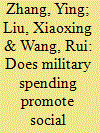

|
|
|
|
|
| Summary/Abstract |
Whether military spending is capable of promoting social welfare is currently a controversial issue. The aim of this paper is to investigate how military spending affects the input and output of social welfare (i.e. social welfare expenditures and social welfare index). A panel cointegration analysis and an impulse response function are conducted with multi-country panel data, over two time periods, 1998–2011 and 1993–2007. In addition, to extend a comparative analysis over different economies, BRICS (i.e. Brazil, Russia, India, China, South Africa) and G7 (i.e. the US, Japan, Germany, the UK, France, Italy, Canada) countries are selected as representatives of emerging economies and developed countries, respectively. The empirical results show that military spending enhances social welfare expenditures in developed countries, while the effect is ambiguous in emerging economies. Also, military spending is capable of promoting the social welfare index based on the FMOLS estimation. The comparative analyses indicate that unlike in the G7, the effect of the growth of military spending on the growth of social welfare expenditures is negative and shorter in the BRICS.
|
|
|
|
|
|
|
|
|
|
|
|
|
|
|
|
| 12 |
ID:
150893
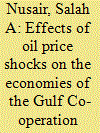

|
|
|
|
|
| Summary/Abstract |
This paper examines the effects of oil price shocks on the real GDP of the Gulf Cooperation Council (GCC) countries. The empirical method used is the nonlinear cointegrating autoregressive distributed lag (NARDL) model of Shin et al. (2013) in which short-run and long-run nonlinearities are introduced via positive and negative partial sum decompositions of the explanatory variable(s). The results suggest evidence of asymmetries in all the cases. We find significant positive oil price changes in all the cases with the expected positive sign, implying that increases in oil price lead to increases in real GDP. Conversely, negative oil price changes are significant for only Kuwait and Qatar with the expected positive sign, suggesting that decreases in oil price lead to decreases in their real GDP. Further analysis implemented using panel data shows that positive oil prices changes increase real GDP and negative changes decrease real GDP. Overall, the results suggest that positive oil price changes have a considerably larger impact on real GDP than negative changes.
|
|
|
|
|
|
|
|
|
|
|
|
|
|
|
|
| 13 |
ID:
110433


|
|
|
|
|
| Publication |
2011.
|
| Summary/Abstract |
The aim of this paper is to provide new empirical evidence on the relationship between energy consumption and economic growth for 21 African countries over the period from 1970 to 2006, using recently developed panel cointegration and causality tests. The countries are divided into two groups: net energy importers and net energy exporters. It is found that there exists a long-run equilibrium relationship between energy consumption, real GDP, prices, labor and capital for each group of countries as well as for the whole set of countries. This result is robust to possible cross-country dependence and still holds when allowing for multiple endogenous structural breaks, which can differ among countries. Furthermore, we find that decreasing energy consumption decreases growth and vice versa, and that increasing energy consumption increases growth, and vice versa, and that this applies for both energy exporters and importers. Finally, there is a marked difference in the cointegration relationship when country groups are considered.
|
|
|
|
|
|
|
|
|
|
|
|
|
|
|
|
| 14 |
ID:
155298


|
|
|
|
|
| Summary/Abstract |
The aim of this paper is to study the relationship between military spending and sovereign debt in a panel of 13 European countries. In particular, under the assumption of the interdependence of military spending between US and European countries, we analyse whether US military spending affected European sovereign debt in the period 1988–2013. The empirical estimation is based on different steps: (i) a unit root test; (ii) an Arellano–Bond panel estimation and a linear fixed effect model; and (iii) a FMOLS estimation to highlight the long run relationship between debt and relevant variables. General results highlight that debt burden of European countries is: (1) positively associated with US military burden and (2) negatively associated with average military burden of other European countries.
|
|
|
|
|
|
|
|
|
|
|
|
|
|
|
|
| 15 |
ID:
125823
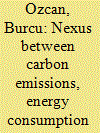

|
|
|
|
|
| Publication |
2013.
|
| Summary/Abstract |
The environmental Kuznets curve (EKC) hypothesis assumes that there is an inverted U-shaped relationship between environmental degradation and income per capita. In other words, as a country grows, it is assumed that its environmental quality improves. In this study, we aim to test the EKC hypothesis for 12 Middle East countries during the period 1990-2008 by employing recently developed panel data methods. Our results provide evidence contrary to the EKC hypothesis. We found evidence favorable to the U-shaped EKC for 5 Middle East countries, whereas an inverted U-shaped curve was identified for only 3 Middle East countries. Furthermore, there appear to be no causal links between income and CO2 emissions for the other 4 countries. Regarding the direction of causality, there appears to be a unidirectional causality from economic growth to energy consumption in the short-run; in the long-run, however, the unidirectional causality chain runs from energy consumption and economic growth to CO2 emissions. We also suggest some crucial policy implications depending on these results.
|
|
|
|
|
|
|
|
|
|
|
|
|
|
|
|
| 16 |
ID:
103343


|
|
|
|
|
| Publication |
2011.
|
| Summary/Abstract |
This paper applies panel data analysis to examine the short-run dynamics and long-run equilibrium relationships among nuclear energy consumption, oil prices, oil consumption, and economic growth for developed countries covering the period 1971-2006. The panel cointegration results show that in the long run, oil prices have a positive impact on nuclear energy consumption, suggesting the existence of the substitution relationship between nuclear energy and oil. The long-run elasticity of nuclear energy with respect to real income is approximately 0.89, and real income has a greater impact on nuclear energy than do oil prices in the long run. Furthermore, the panel causality results find evidence of unidirectional causality running from oil prices and economic growth to nuclear energy consumption in the long run, while there is no causality between nuclear energy consumption and economic growth in the short run.
|
|
|
|
|
|
|
|
|
|
|
|
|
|
|
|
| 17 |
ID:
125870


|
|
|
|
|
| Publication |
2013.
|
| Summary/Abstract |
Much of the existing literature on the relationship between nuclear energy consumption and gross domestic product (GDP) deals only with the causal links between these two variables. However, very little attention has been paid to the structure and form of this relationship. This paper first uses panel cointegration techniques to illustrate the form of an inverted U-shaped curve that arises from pooled data, then, applies the iterative empirical Bayesian procedure in order to account for the heterogeneity in the coefficients of the long-term relationship. The empirical results from a multivariate framework involving carbon dioxide (CO2) emissions reveal that for only 3 of the 21 nuclear countries studied, a linear form of the relationship can be justified and that nuclear energy goes from being a normal good to being an inferior good for the majority of the sample countries.
|
|
|
|
|
|
|
|
|
|
|
|
|
|
|
|
| 18 |
ID:
168701
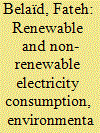

|
|
|
|
|
| Summary/Abstract |
In this article, we develop an empirical model to investigate the causal link amid renewable and non-renewable electricity consumption, GDP and carbon emissions by using a panel of 9 Mediterranean countries over the period 1980–2014. Using the PMG panel ARDL and panel econometric technics, heterogeneity and cross-sectional dependence among the panel were considered to explore the long and short-run dynamic relationships as well as the validity of a proposed model. The results provide panel empirical evidence that there is short-term bidirectional causality between GDP, renewable electricity consumption and CO2 emissions and between non-renewable electricity consumption, GDP and renewable electricity consumption. For the long-term causal relationship, the result indicates that there is bidirectional causality between non-renewable electricity consumption and CO2 emissions. However, there is evidence of unidirectional causal relationships from GDP to CO2 emissions and non-renewable electricity consumption and from renewable electricity consumption to CO2 emissions. The findings imply that non-renewable electricity consumption and economic growth stimulate CO2 emissions in southern and northern Mediterranean countries, while renewable electricity reduces them. This empirical evidence suggests that expansion of renewable energy sources is a viable strategy for addressing energy security and reducing carbon emissions to protect the environment for future generations.
|
|
|
|
|
|
|
|
|
|
|
|
|
|
|
|
| 19 |
ID:
091574
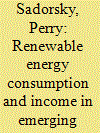

|
|
|
|
|
| Publication |
2009.
|
| Summary/Abstract |
Increased economic growth and demand for energy in emerging economies is creating an opportunity for these countries to increase their usage of renewable energy. This paper presents and estimates two empirical models of renewable energy consumption and income for a panel of emerging economies. Panel cointegration estimates show that increases in real per capita income have a positive and statistically significant impact on per capita renewable energy consumption. In the long term, a 1% increase in real income per capita increases the consumption of renewable energy per capita in emerging economies by approximately 3.5%. Long-term renewable energy per capita consumption price elasticity estimates are approximately equal to ?0.70.
|
|
|
|
|
|
|
|
|
|
|
|
|
|
|
|
| 20 |
ID:
142018


|
|
|
|
|
| Summary/Abstract |
This article analyses the degree of stock market efficiency in three emerging economies— India, China and Brazil. It tests to see if US stock returns have an influence on endogenous stock returns, even after controlling for domestic macroeconomic variables. A country-specific vector auto-regression model is used to test the short-run effects and the fully modified ordinary least square procedure has been used to find the long-run relationship, thus checking for degree of efficiency in these stock markets. The results indicate that, despite controlling for key domestic stock return determinants, US stock returns have a significant positive relationship with the stock returns of all three countries.
|
|
|
|
|
|
|
|
|
|
|
|
|
|
|
|
|
|
|
|
|